Tinubu’s Plan for Safety Nets and Economic Growth
By Patience Ikpeme
President Bola Ahmed Tinubu has announced plans to institutionalize key safety nets as a permanent feature of Nigeria’s economic structure.
This move is part of the administration’s broader efforts to reduce poverty and enhance livelihoods.
Speaking at the 30th Nigerian Economic Summit, Tinubu emphasized the government’s commitment to expanding social programs like the National Social Investment Program (NSIP) and the National Poverty Reduction and Growth Strategy to uplift millions of Nigerians out of poverty.
The President called for stronger cooperation between government agencies, the private sector, and international partners to boost economic growth, enhance competitiveness, and maintain stability. He noted the positive economic indicators resulting from recent reforms, including the removal of fuel subsidies and the unification of exchange rates.
Tinubu outlined his administration’s Renewed Hope Agenda, which aims to foster sustainable economic growth and shared prosperity. He emphasized the need for economic diversification and highlighted sectors such as agriculture, manufacturing, and the digital economy as key to achieving inclusive growth.
The President reaffirmed the administration’s commitment to completing critical infrastructure projects and reducing bureaucratic hurdles to foster entrepreneurship and innovation. He stressed that Nigeria’s competitiveness should be measured not only by global indices but also by its ability to provide opportunities for all citizens, including small and medium-sized enterprises (SMEs).
Minister of Budget and Economic Planning, Atiku Bagudu, echoed the President’s sentiments and highlighted the success of recent reforms. He noted the increase in Nigeria’s GDP growth and the downward trend in inflation. Bagudu urged the public to support the government’s efforts, assuring them of a brighter future.
World Bank Senior Vice President and Chief Economist, Indermit Gill, emphasized Nigeria’s significance in Africa’s economic development. He highlighted the need to sustain key reforms to maintain economic stability.
NESG Chairman, Niyi Yusuf, called for further decisive reforms to strengthen the economy and ensure that gains in FDI and foreign exchange markets are not reversed.




